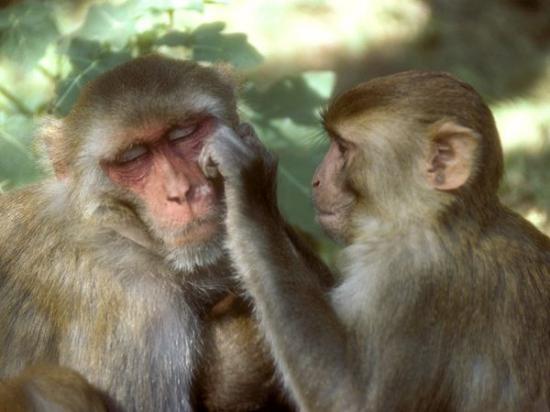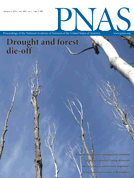
杜克大学的一项研究发现,通过就像防毒面具一样的儿科喷雾对鼻腔进行荷尔蒙控制,可以让恒河猴更关注其他猴子,并且还做出给别的猴子果汁奖励的选择,即使他们自己没有得到奖励。
研究中两只恒河猴相邻而坐,大屏幕上有几种符号可以选择:给自己果汁奖励,给相邻的猴子果汁奖励,或者是不给任何果汁奖励,研究人员训练它们对这几种符号进行选择。重复试验里,它们每次要在上述任两种选择中选择一个:给自己奖励VS没有奖励;奖励自己VS奖励别人;奖励别人VS没有奖励。
神经学家Michael Platt说,“催产素的注入促使猴子做出更亲社会的选择,可能让它们更关注的其他个体。” Michael Platt是这项研究的领导者,同时也是杜克大学脑科学的院长。“如果这是真的,是非常棒的,因为这表明催产素可以打破正常的社交障碍。”
Platt小组早前的研究已经表明当另一选择是没有奖励时,恒河猴宁愿选择把奖励给别的猴子,他们把这个理念称为“替代性强化”。最新的研究数据表明在催产素下暴露半小时后,替代性强化有明显的提高。有趣的是,在第一次暴露后,恒河猴更倾向于奖励它们自己。
研究人员也追踪了恒河猴的眼球运动。当做了亲社会的选择后,恒河猴会注视着其他猴子。在催产素的影响下,当他们做了奖励其他猴子或者一个都不奖励的选择时,凝视会久一点。
Platt说,目前正考虑将荷尔蒙作为一种治疗方法,治疗自闭症、精神分裂症和表现为对其他人明显缺少兴趣或关心的混乱症等。这似乎为病人增加信任和更好的社交技巧,但是这个原理和影响是否长期一致还不太清楚。
他补充道,实验里用的喷雾面具比现在人类所用的喷雾舒服多了,而且通过使用儿科喷雾器让吸入药剂更容易接受。这可能比传统的鼻用喷雾更有助于治疗有自卑症或相关症状的儿童,传统的鼻用喷雾很不舒服。而且喷雾面具能更有效传送荷尔蒙。
研究人员也首次确定鼻腔吸入催产素可以传送到大脑。“要了解催产素是如何在大脑里工作的,工作的地点以及长期治疗的效果,这些都不能在人类身上进行。” Platt说,“啮齿类模型因为行为和神经都相差较远,因此不能提供更多的视角。”

Inhaled oxytocin amplifies both vicarious reinforcement and self reinforcement in rhesus macaques (Macaca mulatta)
Steve W. C. Chang, Joseph W. Barter, R. Becket Ebitz, Karli K. Watson, and Michael L. Platt
People attend not only to their own experiences, but also to the experiences of those around them. Such social awareness profoundly influences human behavior by enabling observational learning, as well as by motivating cooperation, charity, empathy, and spite. Oxytocin (OT), a neurosecretory hormone synthesized by hypothalamic neurons in the mammalian brain, can enhance affiliation or boost exclusion in different species in distinct contexts, belying any simple mechanistic neural model. Here we show that inhaled OT penetrates the CNS and subsequently enhances the sensitivity of rhesus macaques to rewards occurring to others as well as themselves. Roughly 2 h after inhaling OT, monkeys increased the frequency of prosocial choices associated with reward to another monkey when the alternative was to reward no one. OT also increased attention to the recipient monkey as well as the time it took to render such a decision. In contrast, within the first 2 h following inhalation, OT increased selfish choices associated with delivery of reward to self over a reward to the other monkey, without affecting attention or decision latency. Despite the differences in species typical social behavior, exogenous, inhaled OT causally promotes social donation behavior in rhesus monkeys, as it does in more egalitarian and monogamous ones, like prairie voles and humans, when there is no perceived cost to self. These findings potentially implicate shared neural mechanisms.
文献链接:https://www.pnas.org/content/early/2012/01/02/1114621109








